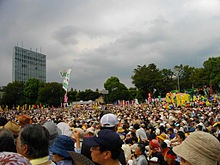In the wake of the 2010 Fukishima nuclear power station disaster, the Japanese government has announced that it will phase out nuclear power before 2040. “Every policy resource will be brought to bear to make it possible to have zero nuclear power plants in operation by the 2030s,” a Japanese cabinet energy policy document states.
By May this year, following mass protests against nuclear power, all 50 Japanese nuclear reactors had stopped generating electricity, as local politicians forbad the restarting of reactors that had been stopped for safety inspections. Currently, only two reactors at one facility are generating electricity.
Now some people are worrying that the long time scale for phasing out Japanese nuclear power could mean that in the short term, it will become easier for the government to restart plants that have been taken out of the energy system since Fukishima. Under the new energy plan, reactors may be restarted if a reorganised national atomic regulator determines that they are safe.
Given that the Fukushima Nuclear Accident Independent Investigation Commission report highlighted collusion among nuclear regulators and industry that set off the Fukishima nuclear disaster, it’s not surprising that there is a lack of public trust in the nuclear regulation system.
Increased Japanese demand for fossil fuels to replace nuclear electricity generation shut down since May has contributed to international price increases in coal and gas, forcing up the cost of electricity in Japan. The new Japanese energy policy identifies a partial solution as reducing energy use through efficiency measures, to 10% less than 2010 levels. It also calls for massive investment in solar, wind and geothermal energy generation to replace nuclear energy – possibly more than $640 bn. However, it also foresees an increased use of gas and other fossil fuels used in dirty electricity generation, such as oil and coal. Which is not so great – in fact it’d be disastrous for climate change and would also definitely raise the costs of electricity.
Japan has already said it will not be signing up to an extension to the Kyoto Protocol. A member of its negotiating team at the United Nations Framework Convention on Climate Change talks in Bangkok told the group Responding To Climate Change that Japan needs to be able develop a new energy strategy without constraints. Ho hum.
Businesses are whining about the costs of this investment and the rise in the price of electricity – overlooking the fact that investment in renewable energy is in fact a major driver of economic growth, since it creates new jobs and helps to increase demand in the economy.
The Keidanren business lobby chairman announced that his organisation “could not consent” to the new energy policy, on the grounds that “Electricity prices will certainly increase, and supply will become unstable.” From his more disinterested viewpoint, Andrew Dewit, energy policy professor at Rikkyo University, says “A total exit from nuclear is positive for the economy, on balance.”
But with the governing NODA party likely to lose the next election, there’s no guarantee that this new energy policy will be carried on by a new government.


